Whether as a remedy for sickness or as a base for a soup, mouthwatering chicken broth knows how to work its magic. Homemade chicken broth takes it one step further with even MORE richness and nutrients and reduces food waste by using up all your scraps. Making homemade chicken broth is a worthwhile cooking trick to learn and will hook you with its ease and flavor.
This post is part of our Basic Cooking Skills series. Each week we will be doing a deep-dive into one basic cooking skill and a brand new recipe to accompany it to practice that newfound skill. Check back throughout the series for updates and new posts.
Please note this post contains affiliate links, which means I receive a small commission, at no extra cost to you, if you make a purchase using the links. Please see my disclosure for more details.
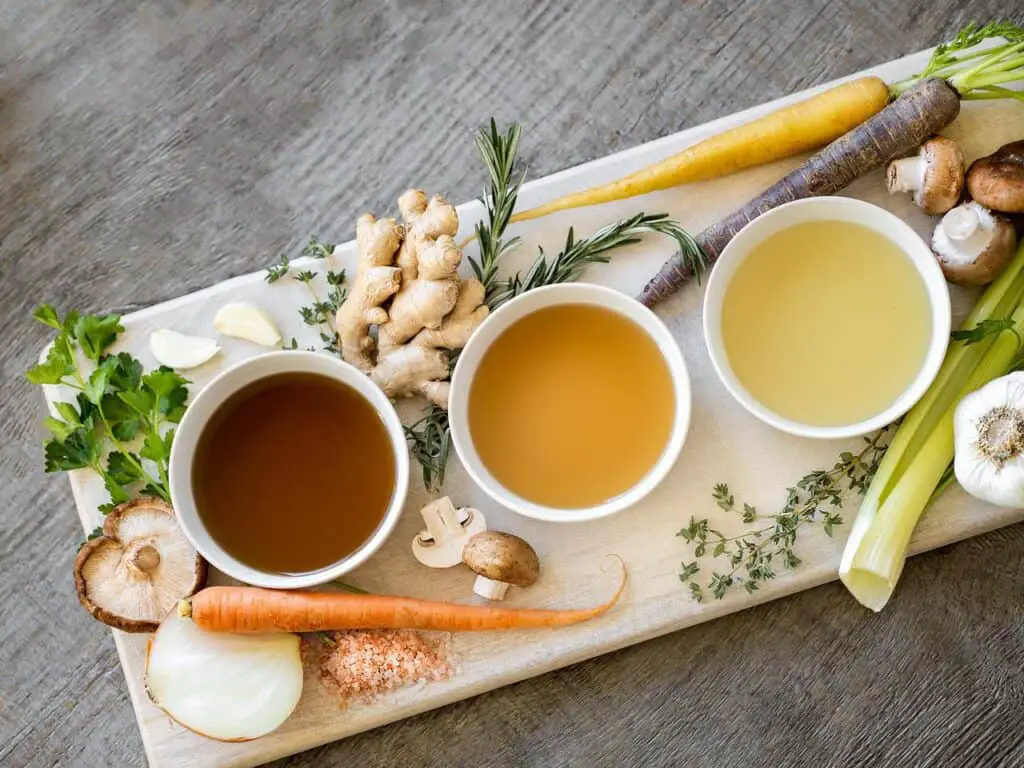
How do you make homemade broth?
It could not be easier to make broth from scratch for you and your family. Make sure you don’t blink because you may miss it!
- Throw vegetable and/or meat scraps in a large pot and fill with water.
- Simmer.
That’s literally it!
Broth is the PERFECT way to use up your vegetable peels and trimmings. Take your onion skin, peeled carrots, celery leaves, and more and put them to good use.
What makes up a good broth?
If you’re planning on making broth in the near future, you can save your kitchen scraps for weeks in the freezer in a storage bag. That way you can stock up on your trimmings for a full broth without having to worry about them spoiling.
You can put practically any veggies from your fridge in it, as long as they are not moldy or rotten.
Spruce up the flavor even more with fresh herbs, aromatics, and peppercorns.
Simmering produce in water works to extract the flavor from the contents and deepen the savory yummy-goodness. Only an hour is needed for veggies but a few hours are essential to get the most flavor out of bones.
Broth vs. Stock
Broth and stock. Those words are practically interchangeable, but is there really a difference?
Technically, YES.
A broth consists of mostly vegetables and meat and simmers for a much shorter time. It is typically a little thinner and lighter than stock.
Stock happens when you also toss in bones! Simmering bones for a long period of time draws out their flavor from collagen, creating a thicker, richer texture. But be sure to only simmer bones for that long and NOT vegetables (they will be overcooked)
There really isn’t MUCH difference here besides the cooking time and increased flavor/nutrients from the stock.
So, if you have a few hours go for the stock! But broth is a great quick alternative that you can still reap the benefits from.
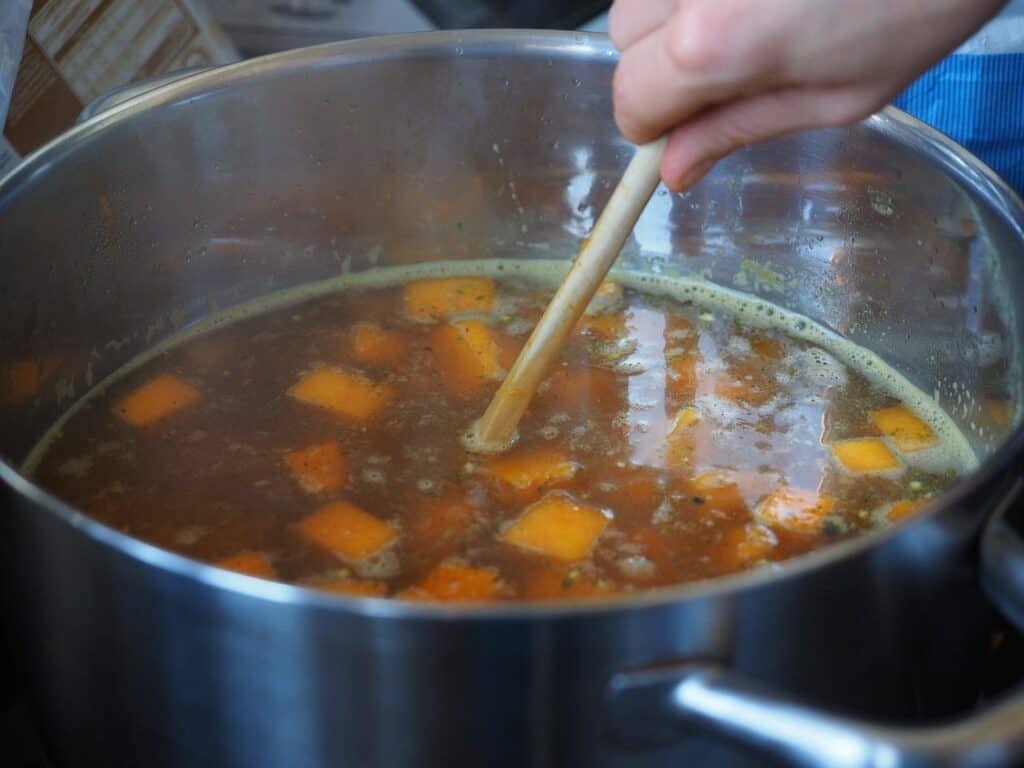
Broth-Making Guide
The Best Types of Broth
- Vegetable – All the veggies, hold the meat and bones! Fun additions include tomato paste for chilis or tomato-based soups or parmesan rinds for a little earthy flavor.
- Chicken – Vegetables, chicken meat, and chicken bones. Simmer just the bones for longer for a thicker stock.
- Beef – Vegetables, beef meat (chuck roast, short ribs, shank, etc.) and beef bones (neck bones, oxtail, knuckle bones). Some specialty grocery stores have soup bones available for an easy purchase!
- Turkey/pork/fish – As you can see, there’s a pattern here. Broth can be made from any type of meat or scraps you have available to make pork broth, fish stock, or more.
Best Tools for making broth at home
- Reusable freezer bags for scraps
- Large soup pot
- Mason jars for fridge storage
- Cubes for freezer storage
The Best ingredients for broth
- Mirepoix scraps – Mirepoix is a flavor base for endless soups and is a satisfying foundation. More info on mirepoix can be found in Making Soup from Scratch.
- Fresh herbs
- Peppercorns
- No cruciferous, tangy and balance out with sweeter
- Avoid starch heavy veggies like potatoes
Best Ways to Store Homemade Broth
One of the best things about homemade broth is how long it lasts:
One week in the fridge, 3-4 months in the freezer, and one year if properly canned
That means savory brothy goodness all year from just ONE pot. That’s my kind of cooking.
Health Benefits of Homemade Broth
There’s a reason why when we’re not feeling well, one of the first recommendations we hear from friends, family, and doctors alike is sipping on broth.
Chicken broth especially is jam-packed with nutrients like collagen, calcium and magnesium. It boosts immunity, fights inflammation, and is easily digestible to support gut health.
Whether you’re battling a common cold, a stomach bug, or something more serious like COVID-19, broth should be near the top of your list for quick relief and comfort.
You can rest easy knowing that broth supplies all the nutrients you need for a healthful life.
Pin me!
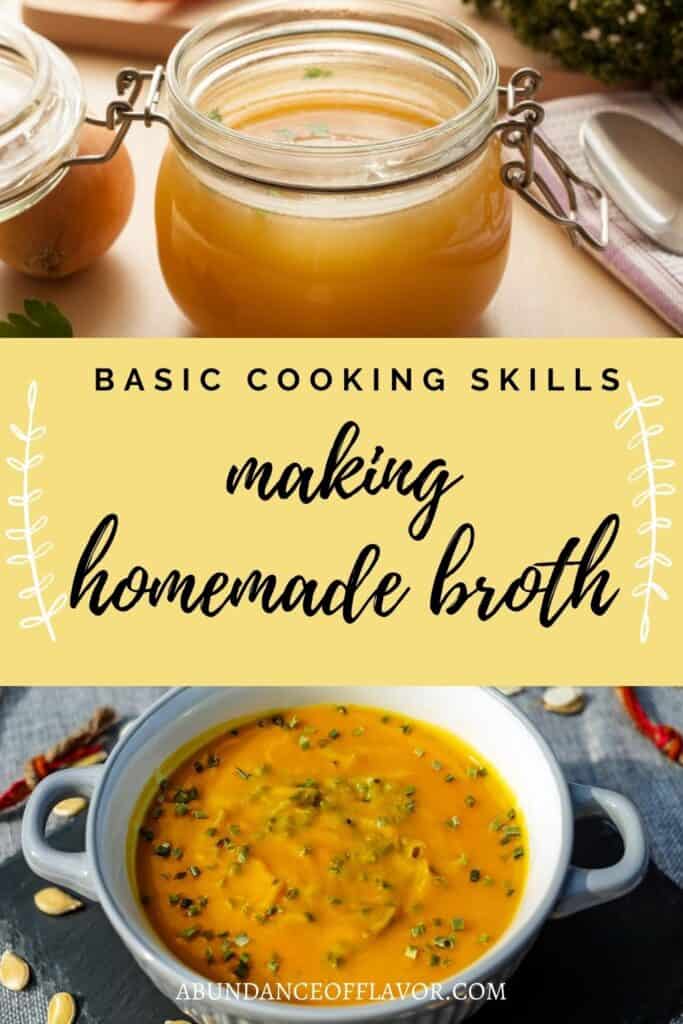
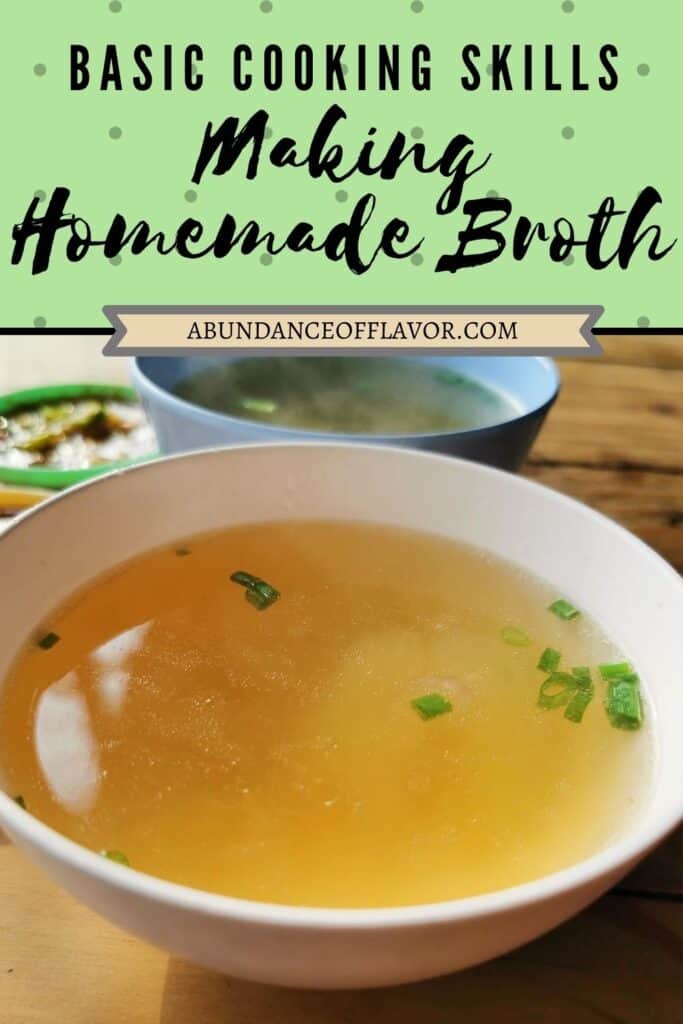
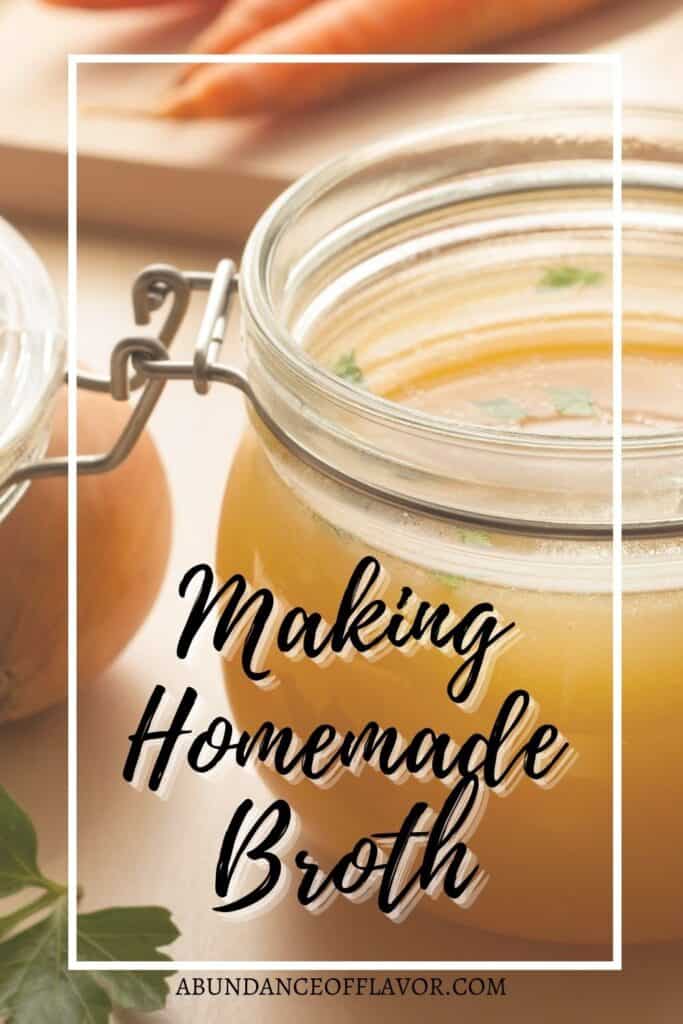
Implement your new skill
Next time you make a whole roasted chicken, save up those scraps and craft a delicious broth!
This thursday I’ll be sharing my tried and true chicken broth recipe that’s SO simple and tasty!
If you have any creative ways to use up food scraps, share in the comments below!

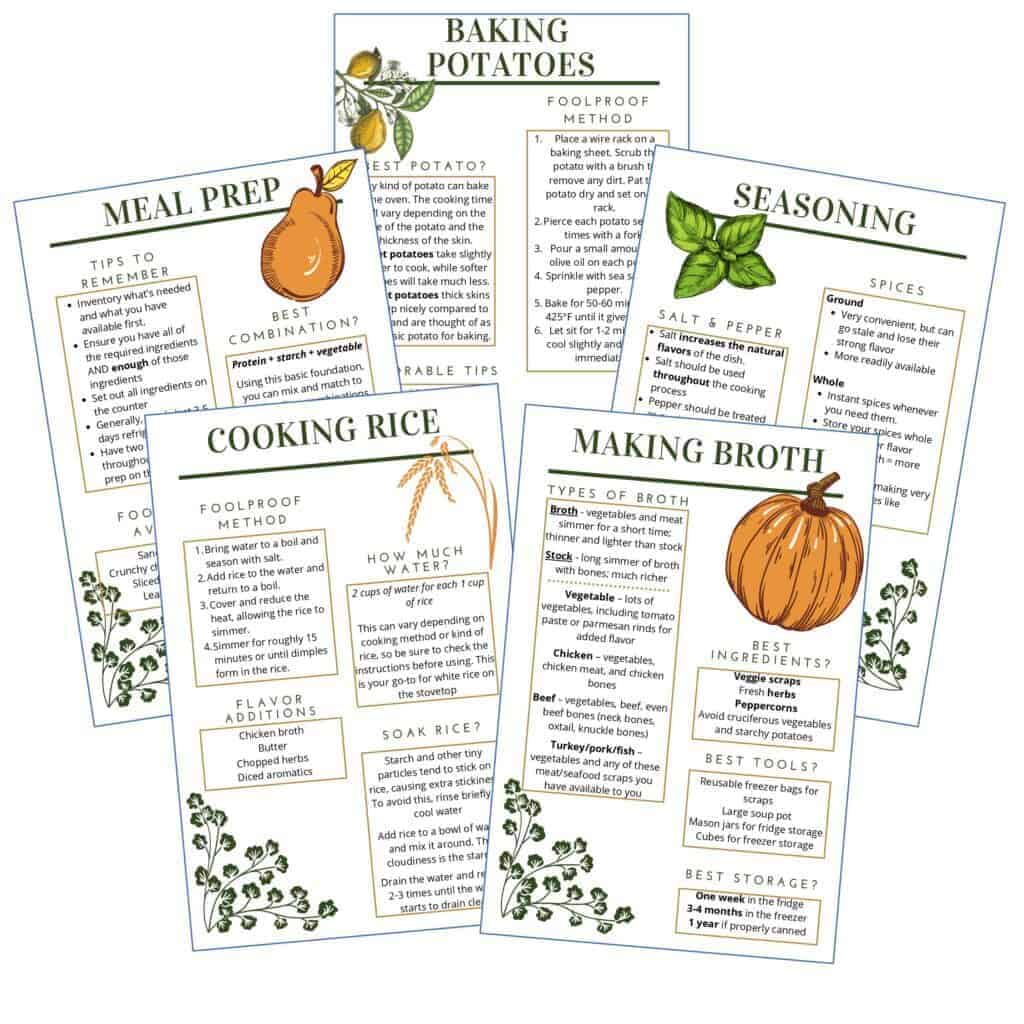

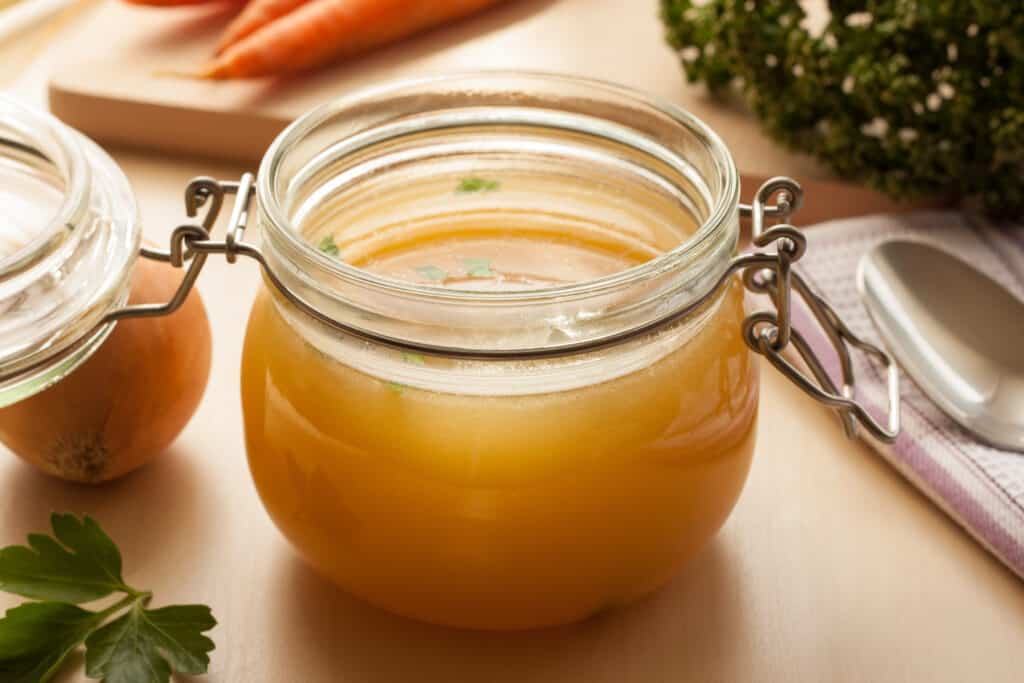



Absolutely going to try it this week!
Didn’t realize it was so easy to do!
Great post- thanks for sharing!
Right?? I felt the same way, like why hadn’t anyone told me before!
Absolutely useful post! Gonna work on it soon!
Thanks so much!
Haha, yesterday I was talking about making broth for today. This is perfect. I also didn’t know the difference between broth and stock. Thank you so much. This was a fantastic read! Are there any vegetables that you recommend using for the vegetable broth??
Aww that’s great! I would definitely recommend celery, carrots, onions, and garlic as starters, and I always throw in mushrooms, fresh herbs, and black pepper too!
So simple, it’s ridiculous. Thanks for the reminder and for sharing.
YES so simple and utterly delicious! Thanks for reading 🙂
I didn’t realise broth was so easy to make and could be kept for so long! So handy!
Between its shelf life and reducing food waste it is definitely a keeper and I wish I had known it sooner 🙂
I can’t believe I’ve never thought of freezing broth before, that’s such a good idea! Perfect for the lazy days too, thanks for sharing 🙂
Anika | chaptersofmay.com
Haha I love the lazy days when I can thaw out a perfectly delicious meal 🙂 thanks for reading!
I have got to get into the habit of doing this with my veggie scraps again as it is so good for homemade soups! Thanks for the reminder!
It’s such a great habit to get into!
I didn’t knew something like this existed
Great advice now is the time people need to eat food like this to get the vitamins and would be the best type of food for the winter months.
https://www.wattophotos.co.uk
Exactly! We could all use a little nutritional boost as we’re going into the colder months
It’s a really great way to use up any veggie scraps!
Wow I just knew about this and I didn’t know how easy to make homemade broth >< Thanks for sharing this xxx
Haha I had always bought it at the store without ever thinking about making it!
I always wonder how to make my own broth with veggies. Thanks for this now I can try
I hope it turns out great for you!
Broth is a good food to eat. I liked chicken broth. Thank you for sharing.
Chicken broth is my favorite! It’s so great by itself or for soups and sauces
Making broth is one of my favorite uses for leftovers 🙂 Great ideas, Kalin!
Thanks so much, I appreciate you reading 🙂
Just what I needed for autumn – thank you for sharing the recipe!
Ingrid | http://www.thatscandinavianfeeling.com
Perfect for the upcoming months! Thanks for reading 🙂
I’ve never made my own broth, so I’m intrigued to give this a go.
It’s perfect for this role of year as well x
I agree, as cooler weather approaches I am in the mood for comforting soups 🙂
I don’t know why, but I never knew it was that simple to make a broth! These will be perfect for the colder months coming, and a great way to make a very tasty gravy!
I will definitely be giving this a go.
Thanks for sharing!
Aimsy xoxo
Aimsy’s Antics
Yay that’s great to hear! It’s such a great routine to get into
Great advice!
Chicken broth is my favorite, but I also make bone broth (it’s beef), its cheap, and the miracles that dish does to your health and body are incredible!
I’ve never made bone broth but in researching it for this I am fascinated at all the different cow bones that are used and how the cooking process affects them. It’s so cool!
Broth is awesome. It gives so much more flavor. Making your own is way more healthier than the packed one. Thanks for sharing the difference between broth and stock I have been wondering of the answer for a while. I will try your recipe as soon as it gets a bit chill here. Thank you for sharing.
Ohh thanks for that post! The only time I tried to make chicken stock, it tasted AWFUL. It was years ago and I can still remember the taste!!! I’m gonna try it again!
oh no!! if the veggies cook for much longer than an hour they can turn butter. I hope this turns out better for you 🙂
Wow I always wondered what the difference between stock and broth was but never bothered to look it up! I also didn’t know you could freeze scraps and use them for broth later. Really good tips and I love your basic cooking skills series! Such a good idea 🙂
Thanks so much for your feedback, I’m glad you learned something 🙂
Broth is one of my home comforts when I’m not feeling 100%. I never really understood what the difference between broth and stock was before though.
It’s just so comforting! thanks for reading!
Broth is so simple but has such good depth! We keep our veggie scraps in the freezer to then toss into some water to boil when it gets full.
That’s such a great habit to start!
I must admit, I do love a good beef broth soup which I’ve had many of times, especially it’s perfect to have in the winter season. I can’t believe how simple broth is to make. I couldn’t have it with chicken, but more than happy enough to try it with other meats.
That’s another thing I love about it, how customizable it is!
I maybe a little simply here but, how do you boil all the goodness out of the veg or mush the veg to make it a broth? Just leaving it to simmer doesn’t seem like enough on it’s own
Just boiling the veggies in the water is enough! You remove all the scraps at the end and strain, but the veggies flavor the liquid they’re in
I have never tried making broth as I figured I never had enough scraps for it. It didn’t occur to me to collect and freeze them! Great tip.
Thanks so much, I’m glad it was helpful!
Who knew making homemade broth was so easy? Wow! I’ll definitely be making my own veggie broth from now on. It will save money and food waste as well. Thank you for the wonderful tip (as always!).
That’s so great to hear, thank you for reading!
Pingback: Healthy Homemade Chicken Broth - Using Leftover Chicken & Vegetables - Abundance of Flavor
I love Broth, it is so easy and delicious
Thanks for sharing
https://uncuaderno4cero.wordpress.com/
Pingback: 21 Basic Cooking Skills for Beginners - Abundance of Flavor
After reading this recipe, will not be using store bought stocks.
That’s great to hear! It’s so easy and so much more tastier